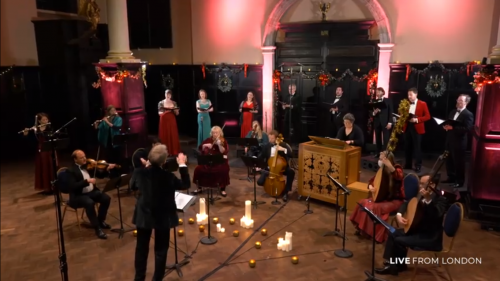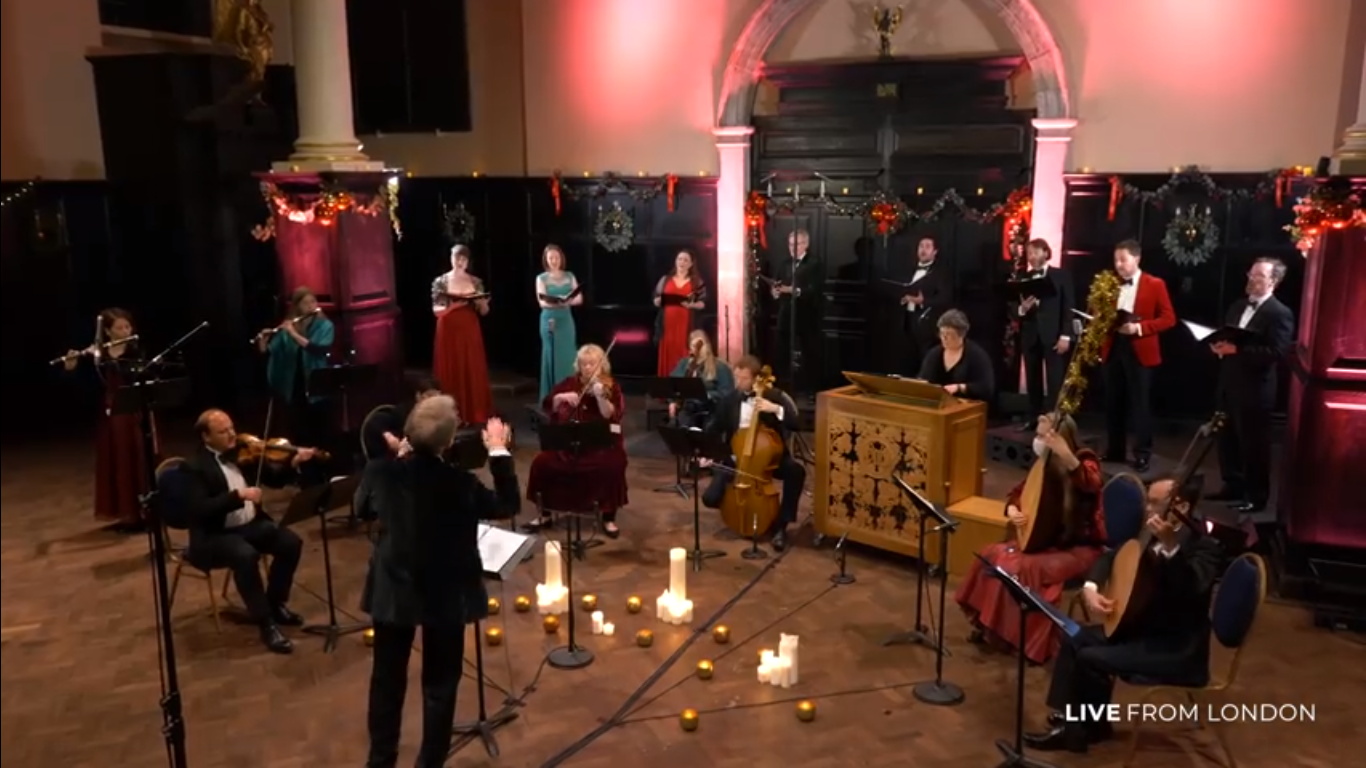 United Kingdom Live from London Christmas: ‘Long, Long, Ago’ – Messe de Minuit: I Fagiolini / Robert Hollingworth (director). Performance at VOCES8 Centre, London, livestreamed on 24.12.2020. (CC)
United Kingdom Live from London Christmas: ‘Long, Long, Ago’ – Messe de Minuit: I Fagiolini / Robert Hollingworth (director). Performance at VOCES8 Centre, London, livestreamed on 24.12.2020. (CC)

Charpentier – Messe de Minuit
Howells – Four Carol-Anthems
Dylan Thomas – A Child’s Christmas in Wales (read by Robert Hollingworth)
Bo Holten – First Snow
This concert was inspired by a poem by a British Prisoner of War, John Buxton, whose 1940 poem Long, long ago was set by Herbert Howells. The Christmas Eve celebration therefore functions as an Anglo-French-Welsh-Danish celebration of Midnight Mass in tandem with four carol-anthems of Howells.
I Fagiolini was joined by an instrumental ensemble comprising two violins (one of which was the respected Bojan Čičić), viola, bass violin (actually larger than a modern cello!), two flutes, bassoon, organ and two theorbos (one an early instrument of 11-strings, one with 14-strings). I do recommend listening to the post-concert discussion between I Fagiolini and Barney Smith, which contains a wealth of information on period instruments form the horses’ mouths (the performers) themselves.
The four carol-anthems by Howells are interspersed throughout the concert. Howells composed the first three as a set between 1918 and 1920; the highly atmospheric ‘Long, long ago’, the first we hear, was composed in 1951.
I Fagiolini’s director Robert Hollingworth, in a cosy dressing gown over his concert garb, next to a well-adorned Christmas tree, read first section of the Dylan Thomas poem brilliantly, complete with a lovely Welsh accent. The poem was segmented into parts, so it interspersed pieces of music.
For the Charpentier, the choir was joined by a selection of our finest period instrumentalists (I love the idea of tinsel around a theorbo’s neck). The piece weaves in French Christmas carols into a sacred frame. It is difficult to imagine cleaner textures for the instrumental opening prior to the singers’ ‘Kyrie eleison’, all this complemented by a fabulous organ solo from Catherine Pierron, prior to the magnificent, gentle ‘Christe eleison’. The melting beauty of ‘Et in terra pax’ in response to the plainsong ‘Gloria’ was one of the most memorable moments of the entire Festival; the celebratory ‘laudamus’ the perfect complement. The dance-like ‘Quoniam to solus’, found a pair of sopranos matched to a pair of flutes.
The modal harmonies of Howells’s ‘Here is the little door’ seem impeccably, deliciously English. I Fagiolini has a blissfully pure sound which seems to add an extra layer of timelessness to the composer’s radiant music. While ‘Long, long ago’ had been to John Buxton, this is to a text by Frances Chesterton. From unaccompanied choir to the chaste strains of the instrumental doublings of the Credo offered another layer of effective contrast. The sheer sprightliness of the instrumental contributions around ‘Deum de Deo’ were the essence of the dance. This lightness really underscored the feeling of the telling of a tale rather than a weighty philosophical consideration of the Mass text.
Somehow the knitting together of fireside storytelling, modal Howells and buoyant Charpentier worked magnificently. Not a combination one might immediately think of, but one in which each part complemented and simultaneously illuminated the other.
Howells’s ‘Sing Lullaby’ is to a text by Frederick William Harvey. The composer sets up hypnotically circling figures that seem to invite sleep and which operate around, over, under and within other vocal lines. The slightly hypnotic, gallant rhythms of the Charpentier Sanctus seemed perfectly in accord with the energy of the Howells, the male-voice Benedictus a superb timbral contrast in itself. And how interesting to hear a spoken Agnus Dei over the courtly sounds from the instrumental group. A magnificent performance.
The, by now, expected Howells that followed was ‘A Spotless Rose’ (Catherine Wentworth’s English version of ‘Es ist ein Ros’ entsprungen’), perhaps the most overtly carol-like of the set, melding with the tender mysticism of Bo Holten’s First Snow.
A magnificent idea, magnificently realised.
The interviews and performances were prefaced by a performance of a song by Marques L. A. Garrett, My Heart be brave, who himself conducted the Michigan School Vocal Music Association, which found the conductor in front of an impressive array of screens. With some impressive computer visuals, this was an impressive acknowledgement of how musicians are blending with technology in these times to create meaningful musical experiences.
Colin Clarke
For more about Live from London Christmas click here.
